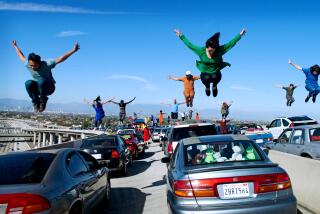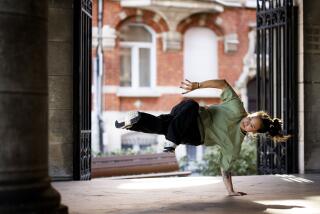The Ultimate Toga Party
- Share via
BERKELEY — For some scholars, the discovery of an ancient Greek stadium and track, a temple to Zeus, a bathhouse and what may be the world’s oldest athletic locker room would be a crowning achievement.
But UC Berkeley classics professor Stephen Miller, who has led archeological digs just outside the Greek city of Corinth for more than 20 years, is not content to merely unearth such treasures. He wants to bring them back to life.
For the past year, Miller has been planning a revival of the ancient Panhellenic Games, the international footraces held more than 2,000 years ago in Ancient Nemea. On June 1, his dream will become reality: Hundreds of people from around the world have registered to run in the 1996 Nemean Games.
UC Berkeley Chancellor Chang-Lin Tien plans to travel to Greece to participate in the races. So does state Sen. Nicholas C. Petris (D-Oakland) and 1960 Olympic gold medalist Rafer Johnson, both of whom will join with other competitors in donning the athletic garb worn in 330 BC: white togas and bare feet. But the races are open to average folks, as well.
“It’s for everybody,” Miller said the other day as he sat in an office strewn with maps of the site, which includes an ancient 120-foot-long tunnel through which athletes will run onto the field of play. The tunnel contains proof that things haven’t changed much in two millennium: graffiti. “I win!” one athlete wrote in 340 BC, though it isn’t clear whether he was making a prediction or gloating.
“As you enter that tunnel,” Miller said, smiling at the thought of it, “I hope that you will feel you really have gone from the 20th century to the 4th century before Christ. . . . [Participants] are going to get their own feet dirty with ancient dirt.”
*
In contrast to the Olympic Games in Atlanta, where commercialism has become inextricably intertwined with competition, the Nemean Games will be decidedly low-gloss. There will be only two events: a 100-meter sprint (200 meters for runners 15 to 25), and a 7.5K run called Footsteps of Herakles, beginning at a temple in nearby Ancient Kleonai and ending in the stadium.
Instead of medals, winners will receive palm branches and crowns of wild celery.
Miller even briefly considered reviving the tradition of having athletes swear the oath of the games while standing on the raw flesh of a wild boar. That, like the ancient custom of competing in the nude, will probably not be part of the modern games.
Still, Miller hopes to make things as true to the original as he can. Runners will place their toes in carved grooves in the ancient stone starting line, just as their predecessors did. Their starting stance will be determined by an ancient mechanism called a “hysplex,” which signals the start of the race with more precision than a starting pistol. Judges clad in black and armed with sticks will be on hand to punish runners who try to get a jump on their competitors.
The Nemea stadium, excavated by UC Berkeley archeologists, is one of four original sites for the ancient Greek Panhellenic Games, the precursor of today’s Olympics. Miller and his colleagues have concluded that the site was like a festival grounds and the events were accompanied by religious rites. Attendance at the games required an animal sacrifice to Zeus.
Miller said the discovery of the ancient locker room told him a lot about the increasing importance of sports at the time. If the athletes were provided with a place separate from the audience, he reasoned, they must have been seen as professionals, different from their fans.
The excavation also revealed something about the spectators. One of Miller’s colleagues discovered that different types of coins were found in different parts of the seating area, indicating that people from particular cities must have gathered together in cheering sections. Very few coins were found in the end zone--even then, apparently, fans saw it as a bad place to sit.
*
Miller’s interest in Ancient Nemea was prompted in large part, however, by something other than sports. When he learned of the area in the late 1960s, during the Vietnam War, Miller was fascinated by “the phenomenon of Panhellenism,” under which warring sects would lay down their arms to compete in the games.
“Panhellenic” means “open to all Greeks,” and Miller said he was intrigued by the notion that “to participate in this event, all Greeks--Spartans and Athenians, Corinthians and Argives--would stop wars and hostilities each year for a voluntary week or two of peace. It was the first voluntary cessation of war in the recorded history of mankind.”
Not only was the truce voluntary, he noted, it was also planned--occurring at the same time each year. “This was the first time in history that there was a regularly occurring organized truce--a scheduled break in hostilities.”
The 1996 games surely won’t put an end to war, but Miller hopes that they will remind participants of their connection to--and place in--history. He has taken to jokingly calling these games “the slow man’s Olympics.” But really, he said, his dream is that competitors in the modern games will forge a link to the past, and to each other.
“The Atlanta games are not for slow people--[to compete there] you’d better be not only fast but the fastest. The point here is to participate with people from around the world,” Miller said. “Our lives are on a continuum with those who have come before. The fact that we have supersonic jets and the Internet is only the technical side of life. It’s the human side that I hope people will understand.”
He used similar reasoning to explain his insistence that people run the races barefoot. Of course, partly he simply wanted to protect the site: “As a selfish archeologist, I don’t want people kicking my antiquities with their shoes.”
But Miller had another reason for banning footwear: “When we take off our shoes, we are very much the same,” he said. “Our common humanity has to be recognized. You may be the chancellor of UC Berkeley, but when we take our shoes off, we’re the same.”
On the subject of feet, Miller has a few warnings for those who plan to participate. The surface of the track is sandy yellow clay--not particularly welcoming to tender soles. Miller recommends participants practice walking on gravel to toughen up their heels.
Miller himself plans to run, and to make that experience more authentic he has stopped shaving. He already has a mustache, but he said ancient athletes never wore them. He is growing a beard. In addition, the nearsighted professor plans to run without his glasses.
He shrugged off a suggestion that it may be dangerous to run blind. “I’ve been working there for over 20 years, so I know my way around,” he said.
(BEGIN TEXT OF INFOBOX / INFOGRAPHIC)
Faxing to Nemea
People interested in participating must register by April 1 by sending their name, address, date of birth and sex to Konstantinos Demetriou, Secretary, Society for the Revival of the Nemean Games, Nemea, GR-205 00, Greece. There is no registration fee, but UC Berkeley classics professor Stephen Miller says because the mails are unreliable, those who have access to a fax machine might do well to spend the money faxing their registration to 011-30-746-24125.
More to Read
Go beyond the scoreboard
Get the latest on L.A.'s teams in the daily Sports Report newsletter.
You may occasionally receive promotional content from the Los Angeles Times.






